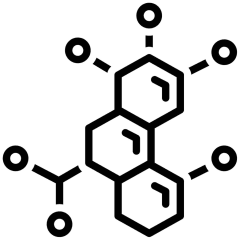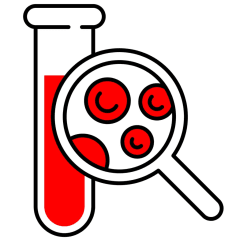10 Best Biochemistry Careers
Bringing together the best of biology and chemistry, biochemistry is one of the most unique undergraduate degrees available. In addition to providing formal training in laboratory science and research methods, students in the program gain valuable knowledge about the inner workings of diseases, genetics, evolution, and more—the very foundations of life on earth.
At the end of their degree, students of biochemistry graduate with more than just a diploma—entering the workforce with a deeper understanding of the world around them and a vast set of transferrable skills. They know how to conduct rigorous research, analyze complex data sets, work with numbers, manage their time, communicate complicated ideas in simple language, and collaborate with others.
Together, these skills set them up for success in a wide range of careers—within the health sciences and beyond. Let's take a look at a few of the most common ones.
This article will be covering the following careers:
| Career | Avg Salary | Satisfaction | Your Match |
|---|---|---|---|
| Biochemist | $91k | 3.4/5 | |
| Pathologist | $204k | 2.9/5 | |
| Pharmacy Technician | $18k | 2.8/5 | |
| Doctor | $253k | 3.5/5 | |
| Journalist | $55k | 3.5/5 | |
| Clinical Research Coordinator | $63k | 3.0/5 | |
| Forensic Pathologist | ?? | 3.9/5 | |
| Accountant | $60k | 2.6/5 | |
| Event Planner | $29k | 3.5/5 | |
| Video Game Producer | $93k | 4.4/5 |
Are these careers suited to you? Our comprehensive career test measures your personality traits and interests and matches you to over 800 careers.
1. Biochemist
It's the obvious choice, but it's worth mentioning. Biochemistry is a fast-growing industry, with job opportunities expected to increase by 11 percent by 2026. It's also a well-paid one, with an average salary that punches above $90,000 a year. Both of these factors make it an alluring option for many biochemistry majors. Biochemists play an essential role in maintaining and bettering human health. They conduct research on a range of biological processes and living things, extending our knowledge about heredity, disease, cell development, and more.

Biochemist
Biochemistry is a branch of science that focuses on the chemical reactions and processes that occur within living organisms.
2. Pathologist
Pathologists are scientists who have dedicated their careers to understanding the inner workings of disease. They work with physicians and other medical professionals to help diagnose, treat, and prevent various illnesses and chronic conditions. Using bodily fluids and human tissue, they conduct research and detailed analyses that allow doctors to make appropriate diagnoses and monitor their patients' health. A medical degree is required in order to pursue this career, but a solid foundation in biochemistry is an excellent first step.

Pathologist
A pathologist is a medical doctor who specializes in the study of disease.
3. Pharmacy Technician
A pharmacy technician is a pharmacist's right hand man (or woman). These hardworking professionals assist with everything from receiving written prescriptions to managing drug inventory. In some states, pharmacy technicians can even mix medications or process refill requests—duties otherwise left to a fully trained pharmacist. Combining knowledge of the life sciences, a high degree of scientific rigour, and strong people skills, this is the perfect entry level job for a biochemistry major.

Pharmacy Technician
A pharmacy technician works under the supervision of a licensed pharmacist to support the day-to-day operations of a pharmacy.
4. Doctor
Of all the undergraduate science degrees you could choose to pursue, biochemistry may be one of the best foundations for a future in medicine. Students in the program gain both the skills and knowledge required to pursue a medical degree after they graduate, including a background in several essential sciences, a capacity for critical thinking, and an understanding of the complexity of life. They can truly thrive as doctors, using their training to help patients overcome a wide array of health challenges.

Doctor
A doctor is a medical professional who has completed the necessary education and training to diagnose, treat, and prevent illnesses and injuries in individuals.
5. Journalist
For biochemistry majors who have a way with words, a career in science journalism can be a perfect fit. Science journalists report on the world's most cutting edge research, exploring the risks, benefits, and ethical questions that accompany each of science's latest discoveries. A large proportion of science journalism is devoted to covering health topics, which makes biochemistry graduates especially well-suited to the role.

Journalist
A journalist gathers, writes, and shares news and information with the public through newspapers, magazines, websites, television, or radio.
6. Clinical Research Coordinator
Clinical research coordinators are the detail-oriented, responsible professionals who keep the world's top research teams on track. They work in laboratories of all kinds, ensuring that clinical trials are conducted as ethically and meticulously as possible. The great "organizers" of the lab, they can take on many duties, including managing records, selecting trial subjects, and writing up accurate reports. Biochemistry majors, with their laboratory training and their dedicated work ethic, are ideal candidates for the job.

Clinical Research Coordinator
A clinical research coordinator (CRC) plays an important role in the field of clinical research, ensuring the smooth and efficient conduct of clinical trials and studies.
7. Forensic Pathologist
Although it's a fascinating profession, forensic pathology is not a career for the feint of heart. These highly trained professionals spend their days examining corpses to determine the cause of death. They play an important role in many criminal cases by assessing whether someone has died naturally—from a disease or heart attack, for example—or whether they are a victim of homicide. On a daily basis, they interact with coroners, medical professionals, and members of the criminal justice system. Intellectually stimulating and financially rewarding, many biochemistry majors find their calling in this unique career.

Forensic Pathologist
Forensic pathologists are both medical professionals and scientists, applying scientific methodologies to the examination of deceased individuals in order to provide insights into the circumstances surrounding their deaths.
8. Accountant
It might seem like a big leap, but biochemistry majors can go on to become talented accountants. Armed with strong data analysis skills, a fluency with numbers, and a systematic work approach, they possess many of the qualities needed to succeed in this career. Although additional training and experience is required, it can be a perfect fit for a biochemistry graduate who loves to crunch numbers, organize information, and help others achieve their financial goals.

Accountant
An accountant manages and analyzes financial records, prepares financial statements, and ensures compliance with regulatory requirements.
9. Event Planner
Over the course of a biochemistry degree, students learn to think logically and prioritize tasks. They also learn to manage their own time, work with teams, and communicate their ideas with clarity. For all of these reasons, they can make great event planners—especially in a science-oriented specialization such as academic conferences. Event planners are natural multitaskers who use their diverse skills to meet with co-organizers, manage marketing campaigns, edit the conference website, and more.

Event Planner
An event planner specializes in organizing and executing various types of events, ranging from small gatherings to large-scale conferences and weddings.
10. Video Game Producer
It may come as a surprise, but some biochemical graduates go on to become highly successful video game designers. With their rational mindset, creative problem solving approach, and ability to analyze complex systems, they already possess many of the foundational capabilities needed to thrive in this career. Of course, they'll need to build up their technical skills in order to transition into this dynamic industry. But once they've mastered the basics, they'll seize the joystick in no time!

Video Game Producer
A video game producer is a key figure in the development process of a video game, responsible for overseeing and coordinating various aspects of production from inception to completion.